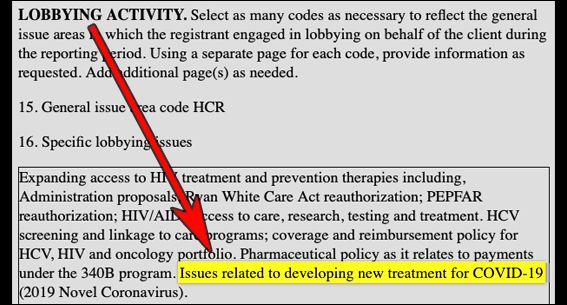
Dr. Anthony Fauci this morning announced that there is “quite good news” on a potential COVID-19 treatment called remdesivir, whose commercial development is controlled by Gilead Sciences — a company that critics say has engaged in all sorts of profiteering. In response to the news (which is still debatable), Gilead’s stock price soared on the expectation that the company will be able to make a jackpot off the new treatment.
Amid a pharma lobbying blitz (detailed below), the question now is whether the government will do anything to make sure taxpayers are not fleeced on the price of a medicine that we the taxpayers funded.
That’s right, as TMI reported almost two weeks ago, remdesivir isn’t some pure private-sector story from a corporation that deserves to make huge profits off a free-market innovation — on the contrary, the medicine was developed, in part, with public investments and publicly funded universities.
The Clinton administration in 1996 repealed a federal rule requiring drug companies to offer taxpayer-funded medicines to consumers at a fair and reasonable price. You should re-read that piece, because you can bet this issue of pandemic profiteering will become more and more significant in the coming weeks.
There’s Legislation In Congress Right Now To Prevent Pharma Profiteering Off Taxpayer-Funded Drugs
For its part, Gilead has made only vague statements about what it might charge us for a coronavirus treatment that taxpayers helped fund.
“We will work to ensure affordability and access so that remdesivir is available to patients with the greatest need,” wrote company CEO Daniel O’Day.
But, of course, Congress doesn’t just have to accept those assurances. It could actually take steps to prevent profiteering by putting a reasonable pricing provision back into law right now. And in fact, there are currently two proposals in Congress to effectively do just that.
Under a proposal from Democratic Rep. Ro Khanna and Sen. Bernie Sanders, federal officials would be required to assess whether prices for particular drugs are excessive, taking into account the “value of federal government subsidies and investments related to the drug.” If a drug’s price is determined to be inappropriately high when considering those government subsidies, federal officials would be empowered to “waive or void any government-granted exclusivities with respect to such drug” and allow lower-priced generic version of the drugs to be produced by manufacturers who offer it at a reasonable price.
A separate proposal from Democratic Sen. Chris Van Hollen and Republican Sen. Rick Scott would impose reasonable pricing requirements on drugs developed at taxpayer expense.
Pharma Has Been Lobbying Against Reasonable Pricing Legislation In 2020
To date, in the entire 535-member Congress, only one Republican (Scott) and 30 House and Senate Democrats have been willing to sponsor these initiatives. That meager support reflects the influence of the powerful pharmaceutical industry and its lobbying.
Federal records from the first quarter of 2020 show that the Pharmaceutical Research and Manufacturers of America (PhRMA) is specifically lobbying on the Khanna-Sanders legislation, as are individual drug giants such as GlaxoSmithKline, Bristol-Meyers Squibb and Sanofi. Drug companies lobbied last year on the Van Hollen-Scott bill.
Another pharmaceutical industry front group called the Biotechnology Innovation Organization (BIO) has been lobbying on “reasonable pricing provisions” in relation to the coronavirus.
Gilead, which controls remdesivir, is a member of both PhRMA and BIO, according to those organizations’ websites. The company reported paying at least $2.1 million to PhRMA and $248,000 to BIO in the first half of 2019. In just the first three months of 2020, Gilead itself spent more than $2.4 million — or $27,000 a day — on lobbying, including on “issues related to prescription drug pricing; and issues related to the coronavirus” as well as “issues related to developing new treatment for COVID-19.” Last year, the company employed 46 lobbyists who had previously worked in government, according to CRP data.
All this lobbying doesn’t happen in a vacuum -- the industry is pressuring lawmakers whose election campaigns it helps bankroll. In the 2018 election cycle, the industry delivered $17 million to federal candidates, and the industry has already pumped more than $10 million into federal elections this cycle, according to the Center for Responsive Politics. That includes $275,000 from Gilead, which so far has directed most of its 2020 campaign donations to Democrats, according to CRP data.
Democrats supposedly control the U.S. House for a reason. In theory, they worked hard to win that chamber in order to help people. In this case, they could get behind the Khanna-Sanders legislation to prevent people from getting priced out of a taxpayer-financed treatment for a disease that drowns people to death in their own lung fluid. They could pass the bill and force Republicans and Trump to try to stop it.
If they don’t, it’s another indication that Democrats have no interest in wielding power and are instead still more focused on appeasing corporate sponsors than mounting any kind of serious opposition during a public health emergency.
Andrew Perez contributed reporting to this story.
This newsletter relies on readers pitching in to support it. If you like what you just read and want to help expand this kind of journalism, consider becoming a paid subscriber by clicking this link.




